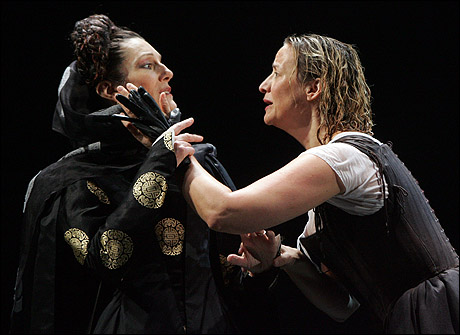
There's a reason why you can only copyright a script and not an idea for a script: a good idea isn't enough. This was made crystal clear to me on my last night in New York during the performance of "Happiness," the new musical by the same team that brought us the brilliant "Contact." The new show director/choreographer Susan Stroman and writer John Weidman (with help from the musical team behind "Grey Gardens") have staged at the Mitzi E. Newhouse Theater at Lincoln Center takes a clever concept and cripples it with cliches and rampant two-dimensionality.
The set-up of "Happiness" is this: a group of people find themselves on a New York subway car that stops suddenly, leaving them all trapped below ground. We first meet the characters (nine of them) as they rush to get wherever it is they're headed and are bludgeoned with the fact that they are either all so self-absorbed, depressed or out of touch that they aren't appreciating the joy of life.
As it turns out, they've lost their last chance to do so. They're all actually dead and the subway car is the waystation to the afterlife where Stanley the Train Man (Hunter Foster, doing his best to rescue this bit of treacle) informs them that they are each to choose one "perfect moment." Each of the moments is remembered via song and dance. In the first vignette the music and dance are organic -- an old woman chooses a WWII USO dance when a young private asked her to be his girl -- but in most of the other situations the music is stapled in place.
Once each has chosen their moment, the car doors will open and they will be able to live in that moment for eternity.
Unfortunately, virtually all the moments are ridiculous cliches and all the characters cardboard cutouts of real people. Joanna Gleason as a right-wing radio host (a more senior version of Ann Coulter it seems) gets off some good lines (of the senior citizen member of the group she says: "She'd make a great book -- the greatest generation remembers. But not much."), but she never feels real. Especially when her perfect moment turns out to be a night in the 60s when she was celebrating an election win by Eugene McCarthy, dropped acid and gave Mick Jagger a hummer. Apparently it represented the last night she held on to the liberal ideals she once loved. Yeah, didn't make sense to me, either. There's the doorman who remembers going to a World Series game with his dad; they were supposed to get the best seats in the house as a gift, but that didn't work out so dad buys the worst seats -- that turn out to be the best. There's the cruel lawyer, the clueless bike messenger/deadbeat dad who finally comes through, the harried (married) medical interns who choose the same perfect moment (everyone now..."awwww!"), the gay interior decorator with the sassy comebacks, etc.
This could be an interesting show if it had some of the tension and honesty that "Contact" did. As it is, it begins weakly, sputters with signs of life from time to time (e.g. one of the deceased remembering the embarrassing web page he left on his computer screen), but finally circles the drain before slipping off into its own afterlife. I can't imagine anyone in the audience choosing that night at the theater as their perfect moment.







